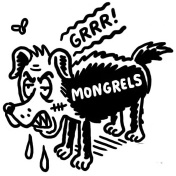|
I live in Merced, CA. It's a small city in the Central Valley of California -- think Stockton with less people. The economy cratered in '08 and has sorta-kinda recovered, with unemployment currently 4.5 points higher than the state as a whole: It's an interesting place culturally and historically. There's a large Chicano population and many Hmong people settled here after the Vietnam War. But I do not think there's a a promising future here for most residents. When the University of California opened its newest campus here, the housing market exploded with speculation and now supply way exceeds demand. The NYT did a story a while back about college students in Merced renting McMansions for a pittance. The outskirts of the city all look like this:  Maybe they'll restart construction and fill in these lots, but it's gonna be a while. In the meantime the university campus will expand a little more, student-oriented business will increase somewhat, and the political old guard will fight it all, tooth and nail. Maybe if we're really really lucky, the city will change its slogan to something more interesting than "Gateway to Yosemite", given that most Yosemite visitors don't actually pass through here!
|
|
|
|

|
| # ? Apr 30, 2024 07:32 |
|
Los Angeles will have to tear down a lot of its quaint little village styled apartments, and likely most of its older apts and single family residences, in favor of planned community mixed-use developments and hipsters townhouses. The housing market is so loving bonkers now there's no reason to not have a 30 unit townhome development where 3 or 4 1940s single family homes stand. I don't see the Purple Line (aka subway to the sea) being very useful to anyone aside from college students and high schoolers that want to hit the 3rd Street Promenade. Traffic's gonna suck bigger donkey balls once all us Poors get shuffled off to Arleta or West Covina. And ironically enough, Hawthorne/Compton will be next on the gentrification hitlist once that Rams stadium matures. That'll probably be the last bastion of non-rich single family homes in the metro area.
|
|
|
|
Vivian Darkbloom posted:I live in Merced, CA. It's a small city in the Central Valley of California -- think Stockton with less people. The economy cratered in '08 and has sorta-kinda recovered, with unemployment currently 4.5 points higher than the state as a whole: Merced is pretty hosed but as long as the UC system will keep dumping money to desperately prop up Merced, it will do better than most Central Valley cities like Stockton/Bakersfield/Fresno/etc which are mostly hosed. But I really don't see it having a huge future and most students don't really want to go there. They might have success trying to carve out a Davis-lite emphasis as a ped/bike friendly self-contained college town with great ag science and heavily invest in STEM fields, but it won't have any of the advantages that Davis has (decent enough weather, close proximity to a lot of jobs in Sacramento with great ties to governmental programs, Tahoe, <1 hr drive down to the bay) and I don't see it striking even copper in the next 10 years, even 20 years.
|
|
|
|
The Inland Empire will continue to grow and hopefully prosper from the LA transplants moving out here. Tech is the second largest growing industry out here and I can see the more upscale towns in the region becoming little silicon enclaves. UC Riverside is gaining traction as a decent research institution and will hopefully improve it's standing as an academic institution. Unfortunately, the rest of the region will be flooded by LA transplants who were priced out by gentrification and with most towns in the IE being bedroom communities, the already-strained freeways will worsen and the air quality, while already pretty bad, will continue to decline.
|
|
|
|
Ofaloaf posted:Detroit might, if another Kilpatrick doesn't come up, have its population drop level out at somewhere a little above 600k. The island-ification of the city will continue apace, with new residential developments increasingly clustered around a few neighborhoods, like Midtown, Corktown, etc., while the rest of the city continues to slide into total abandonment and services are withdrawn from a few areas. The new clusters of development will be whiter and richer than the old neighborhoods being abandoned, and there will be tensions between old Detroiters and the new gentrifiers- the gentrifiers will either be totally oblivious to the social frictions, or deny they're a cause of any problems. There is so much garbage property in Detroit it is really hard to see it being used even in the most optimistic scenario. Like you could drop in 4 or 5 six flags and a few disney worlds and there'd still be left over acres. Even out past the north and west suburbs the price per acre of land is getting loving insane and still nobody is putting up even a pipe dream plan on how to develop any of that junk. The whole slow motion collapse of macomb county isn't really going to help the prospects of any of those neighborhoods either.
|
|
|
|
The Raleigh-Durham-Chapel Hill area of North Carolina will likely continue to grow and prosper based on the strength of its knowledge/tech economy. The presence of Research Triangle Park's high-skill jobs, combined with the major universities of Duke, NCSU, and UNCH that can provide the workers for RTP employers has been and will probably continue to be an asset for the area. This is assuming growth can continue, but in the near term, RTP has a good amount of land, and smart management can mix residential and commercial areas. The nationally-renowned quality of life in the suburbs of Raleigh has attracted rapid growth and a corresponding increase in the price of the typical single family homes. I expect to see working class (and some middle-class) priced out of the more centrally located Apex, Morrisville and Cary to Holly Springs, or as far south as Fuquay-Varina. I have no idea if NC's road infrastructure can handle such a population commuting upwards of 30 miles to where all the good jobs are. Beyond that, I expect to see a lot more immigrants, particularly from South Asia, and their descendants as white people make up a smaller percentage of the population. Morrisville in particular already has over a quarter of its population of Asian descent. Those are my initial thoughts. I'll have to think more on this. William Bear fucked around with this message at 04:10 on Sep 6, 2016 |
|
|
|
Montreal, Qc Who the hell knows, but I'll give it a some kind of attempt: Verdun and Pointe-St-Charles are going to keep gentrifying like all hell. St-Henry has already reached peak Hipsterism, so it'll just stay the same for a good while. The same goes for the plateau. If the light rail project materializes, it could give the city the a much needed shot in the arm. On top of that, the specter of separatism has finally started to dissipate over the last few years. This should begin to be felt abroad soon which will bring back talented labor and business to town. Real estate wise: Developers have been building condos as if the city was going to be the next Vancouver, but the locals aren't buying it, and that's going to cause a lot of doom and gloom over real-estate as the condos market crashes and burns. Houses, and classic Mtl Duplex and triplexes are still going to remain very desirable. However someone is going to have to start building something that people want to buy at some point (beyond monster mansions in TMR). The suburbs are just going to stay exactly the same, save for Brossard, maybe (again depending on the light train project). The Habs won't win a single goddamn cup, and if there are riots over this, it'll just be out of tradition, not actual anger. Aramis fucked around with this message at 04:21 on Sep 6, 2016 |
|
|
|
Uncle Jam posted:There is so much garbage property in Detroit it is really hard to see it being used even in the most optimistic scenario. Like you could drop in 4 or 5 six flags and a few disney worlds and there'd still be left over acres. Even out past the north and west suburbs the price per acre of land is getting loving insane and still nobody is putting up even a pipe dream plan on how to develop any of that junk.
|
|
|
|
Xaris posted:
Depending on how Brooklyn Basin develops, I think Fruitvale/ S International could explode pretty quickly. There is already a SF-style "Fancy Pizza and Craft Beer (Whites only)" restaurant just north of 14th and International. If Tech Culture continues developing in the same way it has been, workers will pay a premium for BART access so they can go to Zeitgeist on the Weekend.
|
|
|
|
Shbobdb posted:Depending on how Brooklyn Basin develops, I think Fruitvale/ S International could explode pretty quickly.
|
|
|
|
Winnipeg, Manitoba The Wikipedia article on the city will describe this place a lot better than I ever could, but the nickel tour is basically it's the capital of Manitoba, which is in central Canada. It actually has a fairly diverse economy and while it doesn't benefit as much from boom times, it weathers weaker economic times a lot better. Also, like most major metropolitan areas, things like economy of scale and corporate mergers mean that a lot of smaller businesses spread out throughout the province are being absorbed or made redundant by services offered in the city. One thing I am intrested in whatching is how this city may change due to climate change. Winnipeg is protected by two floodways, one that diverts the Red River around the city and another that shunts the Assiniboine River into Lake Manitoba. Both are experiencing an increase in water volume because of climate change and the continued destruction of wetlands which help regulate the movement of surface water across terrain. Because of this, I forsee a lot of migration to the city from the smaller communities in the province that aren't protected by the floodway due to the increasing frequency of flooding events. If the flooding trend changes to a drought trend all bets are off.
|
|
|
|
I live in a relatively small (~30k people altogether, ~12k when you disregard all the small villages that officially belong to it too) town in southern Germany. The explosion of rents in Munich thorughout the last 20 years or so has meant that my hometown, even though it's about 45min by car away from Munich, slowly has become part of the greater Munich area with all the advantages and disadvantages coming with it. The advantages are: generally speaking the people have more money; we have profited greatly from the economic situation in southern Bavaria and are now in our fifth year or so of unemployment being below 3%. A couple of years ago we got our own road connecting us to the Autobahn, and since the German Railways let a private business put trains on the local railway line there are way more trains coming and going, during peak hours every 15 minutes even. Also the population around here has been growing, as even more people take jobs in Munich but don't want to pay out of their rear end for rent there. Probably next year we should finally break the 30k, which means that our mayor into an Oberbürgermeister with a larger salary and an official car. We'll probably also turn into a Große Kreisstadt afterwards, which means that the county will delegate some of its duties and privileges to us. The cultural scene is comparatively vibrant with lots of concerts, exhibitions, and the nightlife, which until not too long ago was virtually non-existant (one lovely club and that's it), now also has at least a bit more to offer (the same lovely club is still around, but now there's three (!) hip bars where you can order cocktails and whatnot) On the negative side traffic has gotten increasingly worse throughout the last couple years, what with the growing population and people having enough money to afford a car or several. Used to be that you could lie down and sleep on the main road through the town after 10pm. Now it's cars, cars, cars everywhere. The old characteristics of my hometown - the dialect, the connection to the farmers of the surrounding villages, the blue-collar people, the craftsmen and so on - slowly fade away, and the rent has exploded with no signs of it slowing down. My parents are really glad that they own the house we're living in, otherwise rent would be brutal and potentially non-affordable for us. Lastly there's something which I don't want to put either in the "good" or "bad" camp because it's a huge complex all of its own: the refugees. The ethnic makeup of my hometown already has changed a lot from when I was a kid (I still remember seeing a black dude around here ~20 years ago and being really surprised about that), and the mass of refugees that has arrived during the last years and continues to come will change the face of all of Germany permanently. It's fascinating to see all those "foreign" faces around and hearing many different languages being spoken, and I'm glad to say that my hometown has adapted really well and given the newcomers a heartfelt and kind welcome, and that city, parish and private initiatives have done great work and cooperated really well. We'll have to wait and see what the long-term consequences of that will be, but I'm optimistic that at least my hometown will cope really well.
|
|
|
|
FilthyImp posted:Los Angeles will have to tear down a lot of its quaint little village styled apartments, and likely most of its older apts and single family residences, in favor of planned community mixed-use developments and hipsters townhouses. The housing market is so loving bonkers now there's no reason to not have a 30 unit townhome development where 3 or 4 1940s single family homes stand. Although if LA gets the Olympics in 2024, all this will happen even faster. Especially since unlike 1984, LA won't have the IOC by the balls this time around.
|
|
|
|
Xaris posted:Could be. Not familar with Brooklyn Basin development myself. I guess it's just a multi billion luxury condo/apt self-contained complex? Not really sure how long it'll take to complete but I could see about 10 years being about the major turning point but prolly not much before then--there's a shitton that can happen in the next decade, but at the same time it's really not that far off. But for the next 6+ years, I think emphasis and highly desired hip-areas will be like Uptown, Grand Lake (already absolute obscene explosion), and JLS area, and then probably spilling over as those become the new Mish' or whatever. Don't you live in the East Bay?
|
|
|
|
A town in rural Kentucky of about ~15,000 The relocation of Wal-Mart will continue gutting what used to be the economic center of town. More empty houses will continue being turned into duplexes, and subdivisions will keep cropping up around the outskirts of said Wal-Mart. Said duplexes are getting bought up by the Indians who have bought drat near every gas station in town, and beyond their payments on black BMW's in the parking lot of every single station, it gets sent overseas. The only thing that keeps me from being overtly racist is the fact that white pillheads aren't doing day labor. Sounds lovely, but I do respect the migrants who are willing to work tobacco fields for less than I made as a teenager twenty years ago. That's a poo poo job, even for a living wage. Our school systems will go to poo poo since everyone of child-bearing age has moved out unless they're stuck replacing retiring workers in the local factories. A few who inherited local businesses and can still demand a decent wage from local hospitals will stick around, but it'll go to hell from there. I expect the town I grew up in to be a ghost town of lovely rental properties and retail jobs when the baby-boomers die off. Just an extension of how the town went to hell when the bottom fell out of tobacco in the 90's, oil in the 00's, and natural gas in the past several years. Hopefully I can fund my retirement by then. Otherwise, I'll be hedging my bets on my RN wife being able to retire before our parents' generation dies off. I'm taking over the family business, but I fully expect it to die by 2030, at the very latest. I won't get the title passed to me for a long-damned time, so here's hoping my wife keeps making enough to fund a retirement and doesn't want to leave my rear end until then.  Otherwise, I'm jolly-well-hosed and eating Alpo. Go Cats, I guess? Otherwise, I'm jolly-well-hosed and eating Alpo. Go Cats, I guess?
TheFuglyStik fucked around with this message at 06:28 on Sep 7, 2016 |
|
|
|
Portland, Oregon As a result of the brutal occupation of the Pacific Northwest by Chinese forces in the opening months of the Sino-American war, nobody from California will move here in 2026.
|
|
|
|
The DFW Metroplex sprawl will continue to spread until Denton and Hillsboro are consumed and people are living across the Oklahoma border and commuting into downtown Dallas every day. Maybe transportation technology improves to the point that this is not a waste of everyone's day and soul. Maybe. My particular patch of DFW, Farmers Branch, will still be paying for the stupid anti-immigrant fight the city government picked some years ago. My house and the 60-year-old neighborhood around it will collapse into the clay and probably be replaced with apartments or something.
|
|
|
|
Awesome Welles posted:Houston will worsen as oil prices never fully recover and never reach anywhere close to $100 a barrel ever again, causing the real estate market to continue to shrink with it. The city will continue desperately looking for validation on a national level, calling itself a "world-class city", despite struggling with basic amenities on an almost comical level versus other cities like public transportation worth half a gently caress and a recycling system that would have been effective circa 1985. City officials will continue telling real estate companies and developers to "go hog wild, its whatever Everything inside the loop will continue to be gentrified while pushing all of the people in 3rd ward out of their homes only for them to be replaced by lofts and other trendy houses and poo poo. Houston will continue to attempt to expand even further south of Pearland and Manvel despite there not really being poo poo to expand for. The Texas Medical Center will still be ok though.
|
|
|
|
William Bear posted:Research Triangle stuff I'd like to hear more. I've thought about it as a place to live because it's still close to family. And it seems that NC is going purple, so thats a plus. TheFuglyStik, your story is depressing. A recurring theme I've noticed is that apartments/condos are the preferred developments over single family homes in lots of places. This WSJ article points out that home ownership is at a five decade low. The article isn't long at all, so give it a read. I see the rise of renters as another indicator of a widening socioeconomic gap. Admittedly, I do like the flexibility that renting allows, but everyone has a shittly landlord/property manager/apartment complex story. Anyways, what's your take? Is the increase in renters because of lack of starter home options, or changing preferences with millenials? Maybe something else? How does a lack of home ownership affect the long-term outlook of a city?
|
|
|
|
Personally, I do not want to buy a home because all the homes I can afford are old garbage homes built over 50 years ago and would require way too much maintenance to be worth it.
|
|
|
|
There is actually a huge problem with city neighborhoods where all the homes were built at the same time, by the same developers (usually who also are in with the local aristocracy) and built in the same style or manner. It ends up being a ticking time bomb that blows up after several decades because all of a sudden all the homes in a region start falling apart at the same time. The people who can't afford the increasing maintenance costs all look to offload their homes at the same time, creating a glut in the local housing market. This causes house prices to fall for everyone, including the people who originally didn't want to sell. But now their home price keeps falling, the house gets more and more expensive to maintain, and people panic. If the downward spiral isn't aborted, this can gut whole neighborhood. All because the same people built the same houses at the same time and in the same manner.
|
|
|
|
Manhattan is not likely to get really badly ruined by climate change in the next 10 years -- another Sandy is somewhat likely, but not likely to be regular before 2040 from projections I've seen, and even then it's mostly a problem for Lower Manhattan. The dominant force in Manhattan is going to continue to be ultra-gentrification, as everywhere south of 110th gets priced out of anyone making less than $250k/yr, and they proceed to squeeze Black and Latinx people out of Upper Manhattan, squeezing up from the south and down from Inwood/Washington Heights in the North. Economic base is going to continue to be what it is, with maybe a bit more tech as compared to financial sector. We're probably going to get over the hump of the retail collapse by then, as commercial landlords are going to have to take haircuts on their prime retail rents to service the associated notes and taxes. The old retail is not going to come back, but I think we'll see a resurgence in mid-market street-level retail, as the current vacancy levels are totally unsustainable. Queens is in the catbird seat for the next decade -- if 2000 to now was the era of Brooklyn, driven by unprecedented gentrification of formerly-marginal neighborhoods (Williamsburg, Greenpoint, now Bed-Stuy), I think we're at the start of the era of Queens. We're probably going to lose a lot of diversity, sadly, but I think we'll hang on to more than has remained in Manhattan and Brooklyn, mostly due to some of the ethnic enclaves in Queens being not only entrenched but internally gentrified. I suspect we'll also see a lot of industrial->residential turnover (like my neighborhood, see below) where industrial remains, and a huge upswing in high-end commercial, especially tech-adjacent like specialized manufacturing and back-office financial and corporate. My money for next boom area of Queens is Jackson Heights. Long Island City (my neighborhood of 70,000 people). We're at a crossroads. Either we're going to embrace our economic diversity (Queensbridge Houses barely a mile from new luxury rentals and condos) while alleviating the problems of the depressed subneighborhoods (the food desert around the Queensbridge houses other than Costco), or we're going to squeeze out everything that makes LIC great and wind up with a slightly-larger, less arty Williamsburg. The destruction of 5Pointz does not make me hopeful. The only thing I'm sure about is that (a) the Taxi/Limo industry is going to have to relocate further into Queens or up into the Bronx and (b) all of the vacant industrial is going to get redeveloped, to either high-end residential or commercial. I expect continued expansion of Film/TV. The ferry plan is likely to go through and will probably help, I doubt the weird tram-thing will even get built.
|
|
|
|
Santa Ana will probably continue to gentrify and try and turn itself into a big boy city. Low income people will continue to be pushed out in favor of expensive condos and high rise apartments. Anaheim will still let Disneyland and the hotel chains do whatever they want. Irvine will continue to try and turn itself into a mini Silicon Valley to attract more tech companies. Housing will continue to densify as more and more huge condo / apartment blocks are built instead of single family houses.
|
|
|
|
Uglycat posted:I presently live in South Bend, Indiana. Notre Dame University is just across the river and up a hill. The Studebaker Plant used to be the city's largest employer, and when they went bust 50-some years ago, it really destroyed our local economy. We do have the South Shore Rail line, which runs from South Bend to Chicago (right to Millenium Station). And when fiber was run across the country, it was apparently done along major railroad lines, an' several of those pass through here. We've got the 'combined sewer overflow' thing, with a consent decree signed with the EPA, pledging projects that will likely cost half a billion dollars over the next twenty years. AM General HQ is South Bend, and their major plant ain't to far. Hey, I live about 30 minutes south of South Bend. Moved up here because my wife grew up in North Liberty, didn't know how I'd like it, but it's pretty nice; I agree with your general sentiments. One interesting additional thing to note is that there's an awful lot of remote engineers working for silicon valley out in the midwest (I'm one of them); and I think over time you'll see a surprising boom over the next decade or two of engineering startups out in low-cost-of-living-midwest as those remote engineers start to work on local startups.
|
|
|
|
Aramis posted:Montreal, Qc Who the hell knows, but I'll give it a some kind of attempt: I've been wondering about that myself while trying to decide who has been buying them, and at what rate to justify the prodigious number of the things going up all over the place all the time. It seems like those are the only things being built at all in the town. It boggles the mind. Surely, there can't be that much influx of people into the city who are grabbing them. It might actually become worth it to buy one once the market crashes. I think St-Henri is going to gentrify East of Lionel Groulx on a lesser than Griffontown but fairly quick rate as well. Griffontown I think had a lot of extra space conveniently located near the downtown core that was just easy to grab and turn into condos. I am hoping that a lot of the rest of the city remains the same in the next ten years, and it might, given that it seems like more and more places are trying to put into place measures to prevent apartments and bigger triplexes from switching into condos as part of the craze.
|
|
|
|
Boston will continue to have a massive issue with housing costs. Despite the fact they're watching their neighbors get priced out and forced to move, neighborhood groups will vehemently oppose any and all affordable housing development due to 'traffic concerns'. Luxury condos targeted at rich foreigners will have no such issues. In 10 years Boston will become the per capita champion of 'luxury' condos and is taken over by biotech and tech workers. Public transportation will still be poo poo.
|
|
|
|
Oklahoma City has a lot of promise, and is currently still trending toward the positive, but that progress is precarious because of the drop in oil prices and the gross incompetence of Oklahoma's state government. The last 20 years have been marked by the wild success of the various MAPS (Metropolitan Area ProjectS plan) initiatives, each a 1-cent sales tax meant to fund various capital improvement projects, such as renovating public areas and spaces (parks, the Civic Center Music Hall, libraries, etc.), improving schools, building various sports, convention and other entertainment venues, repairing roads/sidewalks, etc., with the current project being a (rather limited) streetcar meant to connect entertainment districts with newly-developed mixed-use residential/commercial neighborhoods. The MAPS initiatives were spurred in large part as a response to the bombing in '95 when city leaders realized that there was a good opportunity to capitalize on a surge in civic pride and interest in the wake of the tragedy. Attracting an NBA franchise to the city is widely seen as evidence of the success of the initiatives. As a life-long resident of central Oklahoma, I can personally attest to the "livability" of OKC skyrocketing, both in material and emotional senses, since these development projects began. However, a lot of Oklahoma City's recent success was driven by sky-high energy prices. The largest employers were all energy companies: Chesapeake, Devon, Sandridge et al. When prices crashed recently all these companies announced thousands of layoffs. Besides the otherwise expected economic "ripple effects" these layoffs would cause, as mentioned these MAPS projects are all sales-tax based. During the last 20 years OKC has diversified its economy substantially, attracting large non-energy employers like Dell and Boeing, but energy still makes up the largest sector of the economy, and thus the large contraction in this sector spells ill for the future of MAPS, not to mention the city's overall economic health. One positive trend I don't see reversing is the construction of more dense residential areas in the city center. OKC is a huge, sprawling mess--one of the least-population-dense metropolitan areas in the U.S. For many years the city center and peripheral neighborhoods were functionally "dead zones," where people would work but were otherwise completely devoid of leisure/recreation opportunities as well as actual homes. The first MAPS initiative rebuilt "Bricktown," one of the city's first industrial areas, into the city's principal entertainment district. Since then multi-story, mixed-use development has been burgeoning around Bricktown, and more recently has spread out to other inner-ring neighborhoods. I've seen lots of complaints about these kinds of buildings in other cities, and for good reasons: gentrification (primarily), greater traffic/congestion, and also aesthetics (they do tend to be pretty drat ugly). But for OKC, such dense living within the urban core barely existed at all before 20 years ago. The environmental benefits of more dense living, with the prospect of (hopefully? maybe?) better public transit will further increase the "livability" of the city. One negative trend I don't see reversing is the ultra-conservative nature of state politics. In case you weren't already aware, our state government is a loving joke. Rather than list all the ways our government is horrible and wretched, suffice it to say that gross mismanagement on their part will have (and has had) a negative effect on life and living in OKC. One quick example: the state government passing a law recently banning municipalities from passing local minimum-wage increases, something that had been gaining traction previously in OKC. As such, it's hard to say where OKC will be in 10 years. Diversification of the economy, success of the MAPS initiatives and continued high levels of civic pride (and thus support for the aforementioned sales taxes that fund MAPS) keep the outlook bright, but bright enough to overcome the dark clouds of what looks to be a protracted slump in energy prices and one of, if not the single worst state government in the U.S.?
|
|
|
|

|
| # ? Apr 30, 2024 07:32 |
|
pesty13480 posted:I've been wondering about that myself while trying to decide who has been buying them, and at what rate to justify the prodigious number of the things going up all over the place all the time. It seems like those are the only things being built at all in the town. It boggles the mind. Surely, there can't be that much influx of people into the city who are grabbing them. It might actually become worth it to buy one once the market crashes. I think St-Henri is going to gentrify East of Lionel Groulx on a lesser than Griffontown but fairly quick rate as well. Griffontown I think had a lot of extra space conveniently located near the downtown core that was just easy to grab and turn into condos. I am hoping that a lot of the rest of the city remains the same in the next ten years, and it might, given that it seems like more and more places are trying to put into place measures to prevent apartments and bigger triplexes from switching into condos as part of the craze. Montreal has an absurd amount of apartment supply so it wouldn't seem to me to be nearly as good of an investment as other places. quote:http://www.theglobeandmail.com/news/national/how-does-montreal-maintain-its-enviably-low-rents/article31285810/ I guess maybe Montreal condo developers have to compete harder with more of a focus on quality product and they're going after people that are tired of living in old apartments with silverfish and slanted floors. Femtosecond fucked around with this message at 04:49 on Sep 8, 2016 |
|
|




























 you can't tear down history or some nonsense.
you can't tear down history or some nonsense.





